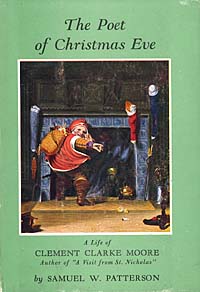|
IT'S not certain that Clement C. Moore wrote the beloved "A Visit from St. Nicholas," the only reason he's famous.
He never claimed it. Henry Livingston may have been the author. Published first in Troy, N. Y. Sentinel,
1823, anonymously.
[The argument behind this is that Moore's book does not include a descriptive introduction to the poem,
which would be a claim, and that the book, itself,
does include poems which he didn't write. Additionally, in his 1862 letter written for
the New York Historical Society, he notes in the passive tense, "Clement C. Moore 1862, March 13th. Originally written many years ago."
Passive tense is often identified as a way that a person can try to dissemble without directly lying.
I don't believe these arguments have much merit. Hoffman wouldn't have included an attribution to Moore in his 1837 book unless he knew
from Moore that Moore claimed the poem. They were friends. Once Moore let his children think he'd written the poem, I think he was boxed into a corner.
He couldn't suddenly tell them that he'd fibbed. And the more he let the fib grow, the harder it would have been
to confess to the little ones he loved so dearly. He was
the only child of an Episcopalian minister who was assistant rector of Trinity Church in NYC at the time Clement Moore was born. That meant
Clement was raised with high expectations of propriety by his parents, as well as by the congregation. I'm not sure Clement Moore ever learned how
to get himself out of tight corners. Once he gave in to the temptation to let his children think he's written the wonderful poem, he was
stuck. And think about the frustration he had to have undergone. He was important in his own right. He was successful. But all anyone
wanted to talk about was the danged poem that he hadn't even written. By the time he died, he must have realized that the poem was the
only way he would be remembered by the future. That couldn't have been very comforting.
|



![]() Copyright © 2014, InterMedia Enterprises
Copyright © 2014, InterMedia Enterprises